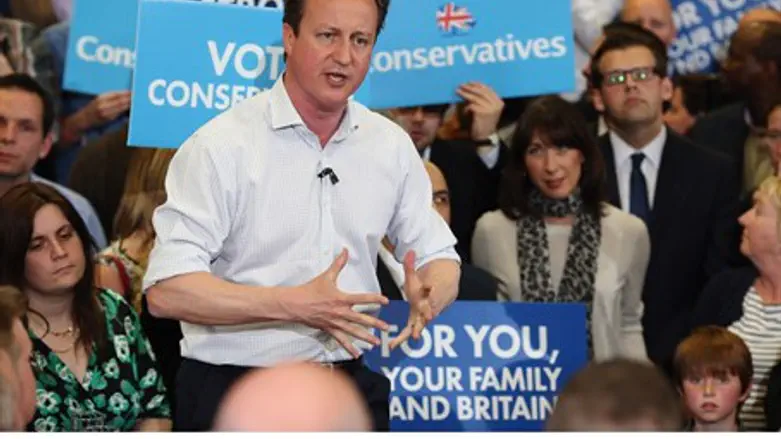
The United Kingdom heads to the polls today, in a vote which could have a considerable impact on Britain's relationship with Israel, as well as its own Jewish population.
Incumbent Prime Minister and leader of the Conservative Party David Cameron is facing a stiff contest from his Labour Party rival Ed Milliband, in a closely-contested election which could go either way.
Some 50,000 polling stations will be operational throughout the country to service the UK's roughly 50 million voters. Voting began at 7 a.m. local time and will close at 10 p.m.
650 seats are up for grabs in the House of Commons, Britain's lower house of parliament and primary legislative body.
The most hotly-contested issues surround the economy, with fierce debate between the right-wing Conservatives and left-wing Labour as to how the country should move forward in managing its economic recovery.
But many British Jews - as well as Israelis - will be focused intently on the respective parties' attitudes towards Israel, and their commitment to tackling growing anti-Semitism and Islamic extremism.
A recent poll indicated that for most British Jews their parties' positions vis-a-vis Israel were a key deciding factor in how they would vote. That was reflected in the fact that an overwhelming majority said they would be voting Conservative, given Cameron's outspoken support for Israel and, perhaps more importantly, the increasing hostility towards the Jewish state shown by his Labour rivals. That, despite the fact that his rival Ed Miliband is Jewish (though a self-proclaimed atheist).
Miliband pushed through a symbolic but highly controversial bill to recognize the "State of Palestine" regardless of negotiations with Israel, which for many in the Jewish community - including many stalwart Labour supporters - was seen as the last straw.
But the issues at hand are about much more than symbolic statements. Under David Cameron, trade between the UK and Israel has soared, hitting a record £2.5 billion (roughly $3.8 billion) in 2014. But a Labour government may be more susceptible to pressure from the far-left and its large Muslim support-base - where calls to boycott and isolate the Jewish state are common - to cut or at least curb Britain's relationship with the Jewish state.
Labour MPs also constituted many of the fiercest critics of Israel's military operation to end rocket attacks against its civilians last summer. Cameron, on the other hand, has made a point of repeatedly defending Israel's actions as part of its legitimate right to self-defense.
Another issue of importance for British Jews is the fight against anti-Semitism, which also reached record highs in 2014. Although still not as severe as in mainland European countries such as France, last summer saw a massive 400% jump in anti-Semitic incidents; although those levels have since fallen, anti-Semitism persists and many British Jews have been left feeling increasingly vulnerable.
But while David Cameron has vowed to fight anti-Semitism if reelected, Ed Miliband has focused on a pledge to criminalize "Islamophobia" - with some critics concerned such legislation could be used to stifle even legitimate criticism of Islam.
The full results of the elections will not be known until Friday afternoon, although the UK's constituency-based electoral system means some seats will already be announced at midnight Thursday.
Local elections will also be taking place at the same time in England - excluding London - with 9,000 council seats being contested across 279 local authorities.